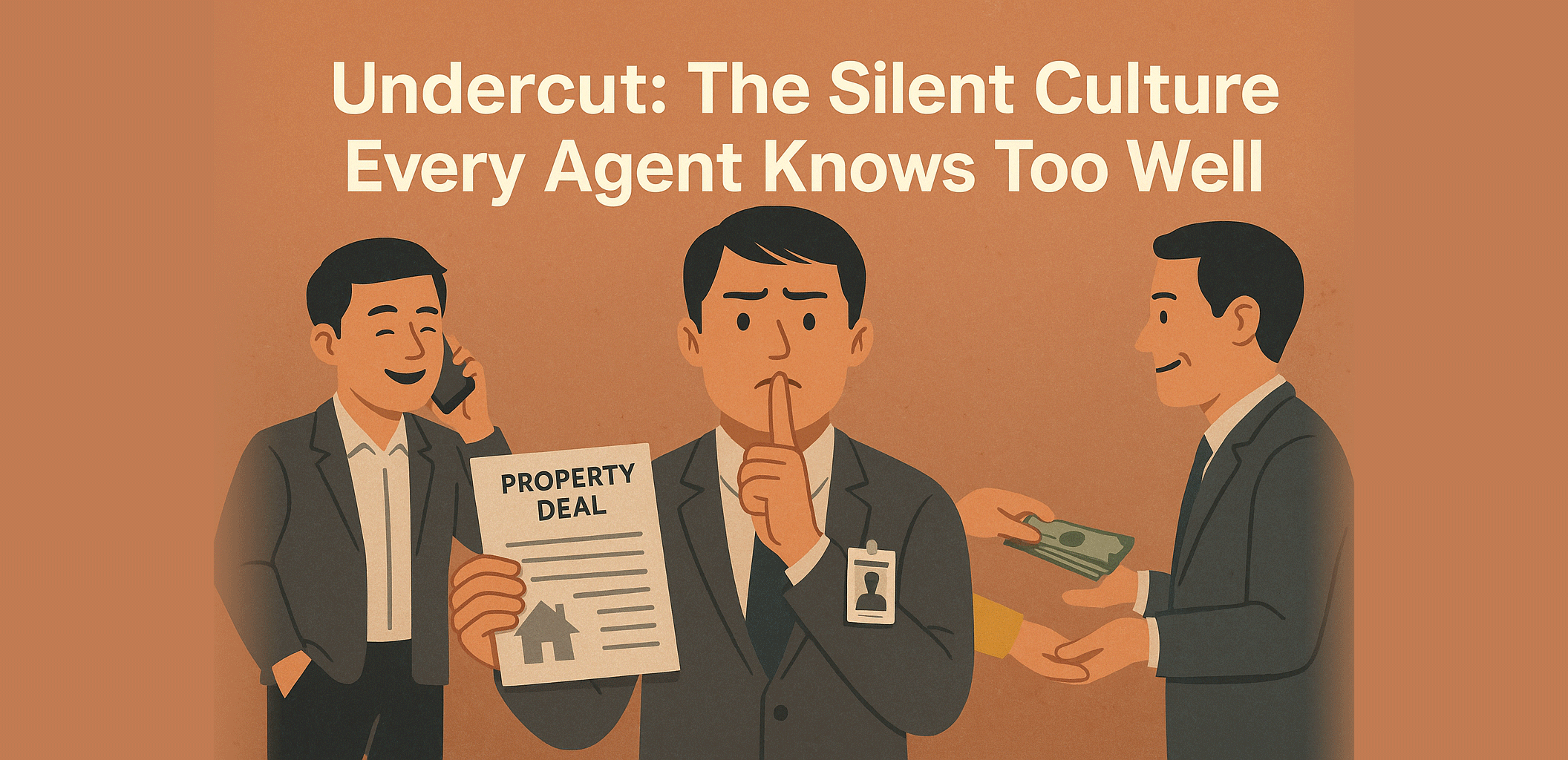Undercut: The Silent Culture Every Agent Knows Too Well

In the Malaysian property market, undercutting is more than just a bad habit — it’s a long-standing culture. Everyone knows it happens. Few talk about it openly. And even fewer admit doing it.
Whether you’re a new negotiator or a seasoned team leader, chances are you’ve encountered it — maybe even lost a deal to it.
What “Undercut” Really Means
In real estate, undercutting happens in two forms:
- Internal Undercut (Agent vs. Agency) – The agent skips submitting the case to the company, handling the deal privately — through their own lawyer or a direct arrangement with the client.
- External Undercut (Client vs. Agent) – The buyer or seller bypasses the agent, closing the deal directly after being introduced, often to avoid paying commission.
Both are common. Both cause silent losses. And both reflect deeper issues in how the market operates.
Why It Happens More in Tough Markets
When times are good, property moves fast. Agents close deals before paperwork even catches up. Buyers compete, listings fly off the market, and everyone earns.
But when times are bad — When listings flood the market, buyers vanish, and tenants hesitate — the mood shifts.
Agents start thinking in survival mode:
“Why split this deal when I found it myself?”
“If I submit, it’ll take too long — someone else will steal it.”
“The company didn’t help anyway.”
At the same time, owners and buyers feel the same pressure. Once they’ve met, many go direct — thinking they’re saving money by cutting out the middleman.
That’s how undercut culture takes root:
Each side feels justified.
Each side thinks they’re the victim.
And the industry quietly bleeds.
The Internal Undercut: Skipping the Company
This version happens inside agencies. An agent finds a genuine buyer or tenant after months of effort. Instead of submitting the case, they handle it privately, often through personal lawyers or direct deals.
The company never sees the file. No case report. No commission record. Only a silent gap where the deal should’ve been.
It’s rarely about greed alone. More often, it’s about mistrust, bureaucracy, or a lack of perceived value from the agency. When pipelines run dry and bills pile up, rules start to blur.
The External Undercut: Buyer Meets Seller, Agent Gets Cut
The second kind hurts more. You do the work — arrange viewings, bridge trust, facilitate offers — Then suddenly, the buyer and seller go quiet.
Weeks later, you find out they’ve closed the deal directly. No commission. No credit. No closure.
In a slow market, both parties see the agent’s role as “optional.” Once contact is made, loyalty fades — replaced by the idea that cutting you out saves cost.
But what it really saves is ethics. And it costs the industry its professionalism.
A Culture That Never Fully Disappears
Every agency boss has tried to stop it. Some enforce strict submission rules. Some issue zero-tolerance policies — warning that undercutting means immediate dismissal, even REN tag revocation. Many run public awareness campaigns, reminding clients to always transact through official company accounts.
These efforts do make a difference. They raise awareness, reduce loopholes, and deter those afraid of consequences.
But even with the best intentions, undercutting still happens. Quietly. Repeatedly. Persistently.
Because as long as the system relies on trust instead of traceability, and manual enforcement instead of digital monitoring, some will always take shortcuts when pressure mounts.
The Systemic Solution: Why ACN Replaces Trust with Traceability
In today’s system, when an internal case is undercut, only one party’s interest — usually the boss or agency — is harmed. For everyone else, silence seems harmless.
But in an ACN (Agent Cooperation Network) model, every transaction is built on a chain of verified roles — listing inputter, verifier, keyholder, buyer introducer, closer, and more. Each role carries its own entitlement, timestamp, and audit trail.
So when an ACN case is undercut, it’s not just one person who loses — it’s an entire chain of participants. Everyone from the listing side to the buyer side feels the impact.
That shared accountability is what makes ACN a powerful deterrent. It systematically replaces individual policing with collective protection, creating a structure where accountability is distributed — not centralised. While not a silver bullet, it builds a culture where you don’t just fear the boss — you’re accountable to your teammates, co-brokers, and an unchangeable data trail.
How ACN Counters External Undercutting
The protection doesn’t stop at internal deals. It also addresses one of the most painful realities in agency work — when buyers and sellers bypass the agent entirely.
In Malaysia, an agent’s right to claim commission often hinges on holding a valid Exclusive Appointment under Act 242. Yet in everyday practice, many listings are secured only through verbal promises or informal WhatsApp agreements — documents that carry little or no legal weight.
ACN changes this fundamentally through the Verifier role. The Verifier’s mandate is to confirm the legitimacy of every listing before it enters the cooperative network. This includes verifying ownership documents and, crucially, securing the Exclusive Appointment.
Only once a listing passes verification is it uploaded into the system. This ensures every property shared within the network is legally marketable, not just technically postable.
The result?
When an ACN-listed property is undercut externally, the agent isn’t relying on screenshots or memory. They hold a timestamped, verified exclusive agreement, backed by the system’s immutable audit trail.
Traditional listings rely on trust. ACN listings rely on proof. And when that proof includes a verified exclusive appointment, external undercuts lose their legal footing.
Final Takeaway
Until the industry adopts a system with role-based entitlements and transparent monitoring, undercut culture will persist — not because agents are inherently disloyal, but because the structure still makes it possible.











































































































